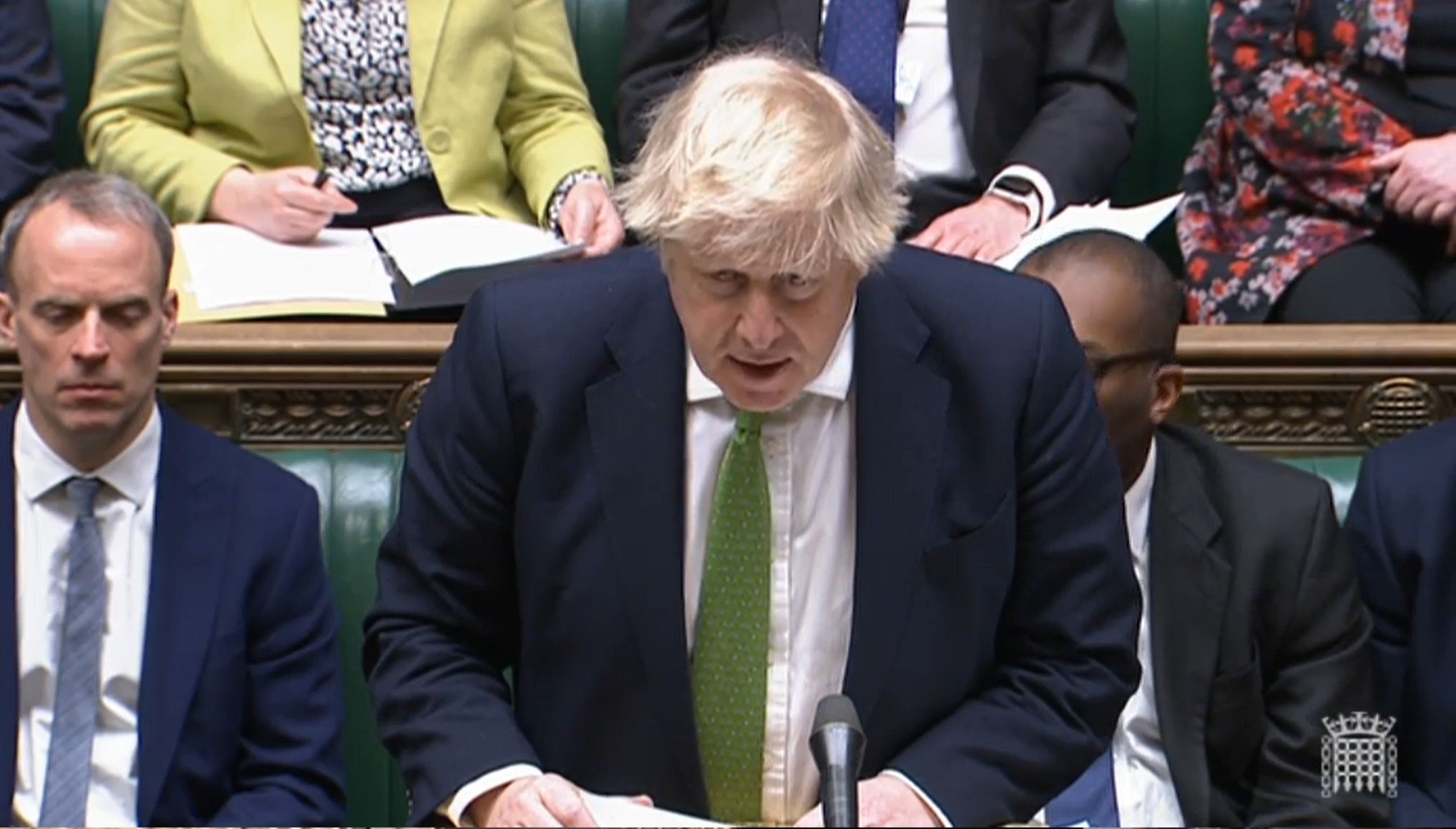The Commons united against Putin’s imperialism, but it all sounded rather hollow
Everyone in the Commons today agreed that Jeremy Corbyn is wrong, Putin is an outrageous aggressor, and More Must Be Done, writes John Rentoul


There was a ghost haunting the House of Commons debate on Ukraine; the ghost of Prime Minister Jeremy Corbyn. If he had won the election in 2017, he might have given today’s statement responding to Vladimir Putin’s renewed invasion of Ukraine.
The ghost himself slipped into the chamber, in the opposition corner furthest from the speaker’s chair, a quarter of an hour after the prime minister started speaking. Perhaps he would ask a question, as he did of the defence secretary yesterday. But no, he slipped out again a few minutes later.
Apart from that brief appearance, none of the MPs who signed the Stop the War Coalition statement on Ukraine last week seemed to be in the Commons today. But their views – that Boris Johnson is guilty of “sabre-rattling” and that Ukraine has no “sovereign right” to aspire to join Nato – hung over the proceedings.
Keir Starmer, in his reply to Johnson’s statement, offered Labour’s unequivocal support for the government’s “barrage of sanctions” against the Putin regime. He pledged his support for the freedom of the Ukrainian people and their “right to determine their own future without the gun of an imperialist held to their head”.
That was a way of saying that the Labour Party is under new management, no longer run by people who automatically think that imperialism is something that we and the US do. The prime minister understood the code, and started his response to Starmer’s reply by commenting on the “welcome change in the approach taken by the opposition over the last two years”. Labour MPs didn’t like it – it seemed a needless partisan point at a moment of cross-party unity – but Johnson thought he was on their side against the unseen Corbynites. He was trying to praise Starmer, who became leader 22 months ago, and repeated the phrase “over the last two years”.
That spirit of cross-party consensus was maintained by Alison McGovern, a Labour MP, who said: “Many Syrians will know that the continuation of Putin’s aggression was not only predictable, it was predicted on both sides of this house.” In what appeared to be a rebuke not just to Corbyn but to his predecessor as Labour leader, Ed Miliband, who helped frustrate a response to the use of chemical weapons by Putin’s ally Assad in 2013, she went on: “As was true in relation to Syria, the only response to aggression is coordinated international resolve.”
Unfortunately, as Corbyn had left by then, we never found out how a British government led by him would have responded to Putin’s peacekeeping efforts in autonomous parts of the former Soviet Union. It would have been interesting to see how he developed the line of thinking suggested by his question yesterday, when he asked Ben Wallace, the defence secretary: “If the Russians pulled back, would he be prepared to countenance any reduction in the Nato presence on the border, to bring about longer-term, secure peace in the region?”
In his absence, the Commons was united in fierce-sounding rhetoric against Putin’s aggression, but found its unanimity somewhat unsatisfying. The prime minister read out a well-written statement, but even he seemed a little underwhelmed by the measures he proposed as a punishment for the new incursion: the freezing of assets of five banks we had never heard of and the removal of the right to travel to the UK of three individuals, one of them called Boris, who turned out to have been on a US disapproval list for four years already.
Starmer tried to sound indignant about “Russian money” which has been allowed to “influence our politics”, but even he didn’t sound convinced by the charge. Which is hardly surprising, as despite a lot of noise about Putin trying to interfere in British elections there has never been any credible evidence that it amounted to more than conspiracy theories broadcast by Russia Today, the Russian state-run TV channel, and the setting up of a few Twitter accounts. Still, Starmer called for Russia Today to be closed down, which would be easy enough to do.
To keep up to speed with all the latest opinions and comment sign up to our free weekly Voices newsletter by clicking here
But what was missing from today’s theatre of unity in parliament was any idea of what to do about the fundamental question of the rest of Europe’s dependence on Russian natural gas. It was all very well Johnson announcing that Russia would not be allowed to host international football matches, but the only sanctions that could really hurt Russian economic interests would be painful for Britain and the EU as well.
The prime minister said it was “absolutely vital that we hold in reserve further powerful sanctions in view of what President Putin may do next”, which sounded like King Lear’s terrors of the earth, in that Johnson doesn’t know what they are – or whether he could agree them with the US or the EU.
Everyone in the Commons today agreed that Jeremy Corbyn is wrong, Putin is an outrageous aggressor, and More Must Be Done. But what precisely? At that point, all the ringing condemnations faded into thin air.






Join our commenting forum
Join thought-provoking conversations, follow other Independent readers and see their replies
Comments